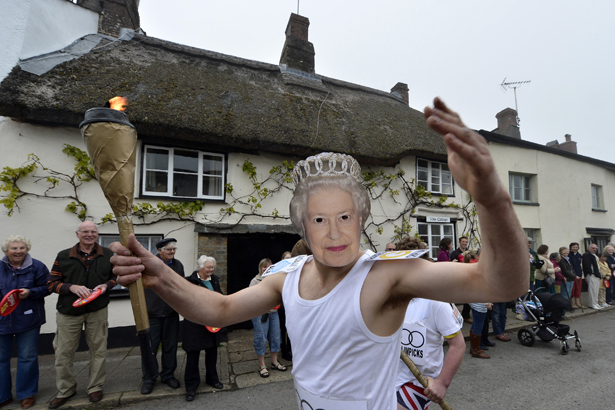
Crowds line the streets as a locally organized torch relay race is run ahead of the Olympic Torch Relay in Hatherleigh in south west England May 21, 2012. Some 8000 runners are participating in the Olympic Torch Relay which will cover over 8000 miles throughout Britain, Northern Ireland and Ireland over the next ten weeks before the London 2012 Olympics. Reuters/Toby Melville
To be in London, two months before the 2012 Summer Olympics, is to feel a bit like a fish in an aquarium, with people constantly poking at the glass. Cameras adorn nearly every street corner and police vehicles are more prevalent than double-decker buses. It’s easy to understand why many are saying enough is enough.
On Saturday, July 28, protesters will be gathering in London to just say no to the priorities imposed by these most corporate of Olympic Games, and it’s hardly difficult to understand why.
Security forces are busily militarizing the urban terrain. Olympics security officials recently unboxed the military-grade Long Range Acoustic Device (LRAD), an eardrum-shattering weapon that has been war-zone tested in Iraq. There are plans to station surface-to-air missiles on the roofs of London apartment buildings. The Royal Navy’s biggest warship will sit along the Thames. Typhoon jets and Lynx helicopters will be ready for action. Scotland Yard has stockpiled more than 10,000 plastic bullets. Police are constructing mobile stations to facilitate swift bookings. And “dispersal zones” have been set up where police can freely ban anyone they deem to be engaging in antisocial behavior.
None of this comes cheap. Londoners were told that the Olympics would cost £2.4 billion. Projections that include ballooning infrastructure costs are now looking at £24 billion, ten times the original bid’s estimate. They were told that the games would be funded with a “public-private partnership,” but the “private” end is now picking up less than 2 percent of the tab. In such an atmosphere, protest is inevitable, but the people coming out on July 28 are angry about more than militarization and debt. There are other issues drawing people into London’s privatized public square.
Olympics sponsorship has become a full-throttle, corporate cornucopia. London Games sponsors include icons of health and fair play like McDonald’s, British Petroleum and Dow Chemical. In the name of good health, McDonald’s is handing out “activity toys” for kids to play with after munching down their Happy Meals. BP is—no joke—an official “sustainability partner.” Dow Chemical’s prominent presence is a slap in the face to London’s large South Asian population, given the notorious gas disaster in Bhopal, India, that killed more than 20,000 people and left hundreds of thousands more suffering in its wake. In 1999, Dow Chemical merged with Union Carbide, the US firm responsible for the Bhopal nightmare.
The UK Tar Sands Network has been active, helping carry out a gutsy intervention at the Royal Shakespeare Theatre where, dressed in Shakespearean garb, activists stormed the stage and delivered a brilliant monologue—“To BP or Not to BP?”—and urged patrons to tear out BP’s sponsorship symbol from their program.
Behind this Bizzarro World where McDonald’s means health and BP stands for sustainability are the plutocrats and moral midgets of the International Olympic Committee.
More than a year after the Arab Spring, this is one dictatorial operation still chugging along. Originally a decaying assemblage of barons, dukes and counts, the IOC has now broadened its membership to include our modern royalty, the mega-wealthy. Having only allowed women as members in 1981, the IOC is the 1 percent of the 1 percent, a global cosmopolitan elite that drips with privilege.
To stage the games, host cities must submit to a laundry list of IOC demands, and London is no exception. It has set aside 250 miles of VIP lanes for exclusive use by members of the “Olympic Family,” including athletes, medics and corporate sponsors. London organizers are required to secure nearly 2,000 rooms for IOC bigwigs in the finest five-star hotels. To control commercial space in favor of the Olympics’ corporate donors, the “Technical Manual on Brand Protection” dictates, “candidate cities are required to obtain control of all billboard advertising, city transport advertising, airport advertising, etc., for the duration of the games and the month preceding the games to support the marketing program.”
As the games approach, and you begin to mark your favorite athletic contests on your calendar, remember that at noon on July 28 there will a different kind of event: when campaigners come together not to celebrate the breathtaking athleticism of the Olympics but to challenge the breathtaking audacity of Olympic elites.


